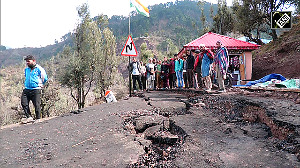Agitations in Kashmir are no more about the Amarnath land row or the alleged economic blockade imposed on the Valley, hitting the fruit industry. From the silent merchant, who sports a black flag on the counter, to the slogan-shouting masked youth driving around town with green flags, the protests are all about freedom now.
After the staggering turnout for the funeral of senior Hurriyat leader Sheikh Abdul Aziz in Pampore on Saturday, leaders of the separatist groups say they no more have any say in the scheme of things and it is the people who are leading them.
"To be very honest, we never expected such a response. Now even our leaders do not know what to do," senior Hurriyat leader Shahid ul-Islam said.
"Even on the day Aziz was killed, our leaders were under house arrest. People came in droves and dragged them out. There is nothing our leaders can do now. We have realized that the people won't listen to us even if we ask them to stop this. There is nothing we can do except appealing to the protestors to carry on in a peaceful manner," he said.
Asked if Hurriyat leaders had any solution to restore normalcy in the Valley, Shahid said the leaders are trying to first channelize the protests and then take it forward from there.
"The only thing we can do as of now is to channelize the protests and ensure that things remain peaceful and don't get out of hand," he said, adding that the first step is to internationalise the issue with the march to the office of the United Nations Military Observers Group on Monday.
"We have to take our message to the world," he said.
The sight of people from all walks of life spilling out on to the streets of the Valley has stumped even those who believe nothing will change in the Valley.
"Initially I thought this was another gimmick by the politicians. But when I saw the response to the Pampore rally, I was convinced that this is a people's movement," said Mohammed Sharif Baig, who is in the construction business.
The moment he saw the Pampore rally, he bought tickets for his workers from Bihar and other places outside the state and asked them to go home.
"I realized normalcy wont return very soon to the Valley now. This has gone out of the hands of the politicians and the people have taken over. There was no point keeping my workers here," said Baig.
He had earlier been cursing the agitation. My company was involved in the construction of a hotel, a bridge, a wall and a road. All the work came to a halt. I was suffering huge losses on a daily basis. I had no fuel for my cars and had to use the driver's scooter. I was totally against those who had started this agitation.
"But when I see so many people braving the security forces that killed 25 people in two days, I no longer am bothered about business. This time I want something to come off it," he said.
Many others agree that the recent protests are unprecedented.
"This is more important than the days when people believed in the gun and took to arms," said Shahid, himself a former militant.
"I was one of those who believed in the gun in those days. But now when I see these people on the streets, I think they are more courageous and also believe in change now," he said.
Hotelier Gowahar Mir agreed: "These protests were totally unexpected. And the most important thing is that these people are not armed. They are out on the streets and raising slogans. Whoever is organizing this, has to be appreciated for ensuring that the protestors do not resort to violence," Mir said.
The administration has also suffered a lot from the week-long spell of agitation. First, they were criticised for their alleged highhandedness in handling the march to Muzaffarabad. Following the criticism and the transfer of the IG, they had to cede the edge to the protestors, inadvertently, emboldening the mischief mongers.
With the public mood favouring another march to Muzaffarabad following Monday's march to the UN office situated in a sensitive area, the administration is sitting with its fingers crossed.






 © 2025
© 2025